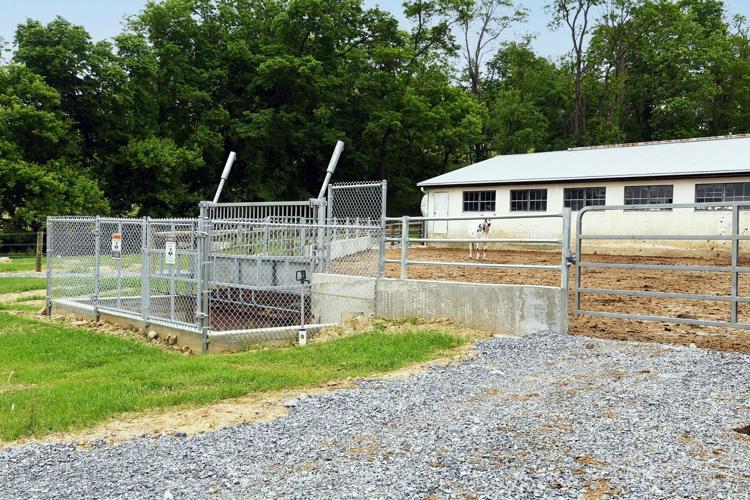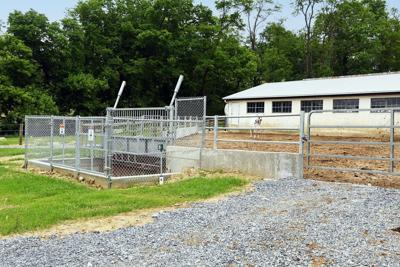A conservation partnership that’s spent $30 million helping Pennsylvania dairy farmers reduce their impact on local waterways started with then Turkey Hill CEO John Cox wondering what one company could do to clean up its supply chain.
Turkey Hill decided to require its milk suppliers to write and implement conservation plans - and that meant finding resources for farmers who needed support.
The resulting seven-year partnership between the dairy co-op Maryland & Virginia Milk Producers Cooperative Association and the environmental nonprofit Alliance for the Chesapeake Bay has grown to serve more than 800 farms across the Chesapeake Bay watershed.
“Working with the co-op really provides a pathway for unified communication and opportunity for funding a big idea as opposed to one farm at a time,” Cox said. “It’s got a certain efficiency and effectiveness to it.”
READ: State invests $1.5 million in agriculture conservation research
Don’t be fooled by the co-op’s name - 80% of its 900 members farm in Pennsylvania. Within the Commonwealth, more than 150 projects have been implemented on farms, from enhanced mature storage to 15,400 new trees.
More than 100 of those projects have been built in Lancaster County, where the partnership serves more than 250 farmers.
The co-op’s output will soon be more visible to local consumers, as the purchase of a processing plant in Philadelphia, announced in March, will give Pennsylvania’s dairy farmers another outlet for their product and increase the presence of the co-op’s brand, Maola, in local stores.
Anthony Zimmerman, a cattle farmer in Lititz, said the partnership between the co-op and the Alliance works well because everyone involved understands what dairy farmers need.
“It’s not a bunch of inconsiderate folks,” Zimmerman said, “It’s a group that sees the challenges we as farmers face and are willing to walk alongside of us and help where they can.”
Zimmerman’s 100-acre farm in Lititz boasts 185 cattle and an enhanced manure storage facility that increased the farm’s storage capacity from three to four months to five to six months.
“It makes a big difference,” Zimmerman said. “We have nutrients for the crops when we need it.”
The expanded manure storage means Zimmerman can better target his manure spreading, reducing the chance that excess runoff will send nitrogen and phosphorus into the local waterways.
Cattle walkways and fences were also installed to keep the animals away from the farm’s stream, and trees were planted along the farm’s spring to further address erosion.
“We as farmers, as stewards of the land, need to do our part to see the concerns and the possibilities that others see,” Zimmerman said.
READ: Farmland in Lancaster County decreases as market value rises

The Zimmerman family farm's sustainability improvements include streamside tree plantings.
Sustainability in farming operations is a multifaceted goal, Zimmerman said.
“I need my farm to, one, provide a means for me to provide for myself and my family - both financially and with an environment that allows us as a family to grow and work together,” Zimmerman said.
His secondary goal is to produce wholesome food for his friends and neighbors, and his third goal is to maintain his farmland so that it is as good as or better than it was before he arrived, Zimmerman said. “We all move on at some time,” he added.
Building on trust
Working through the co-op has allowed the Alliance to take advantage of long-standing relationships between members and co-op staff.
“We could walk onto the farm with their farmers and there was just a sense of trust that we’re immediately walking into,” said Jenna Beckett, the Alliance’s agriculture program director.
Those pre-existing relationships have enabled the Alliance to complete its outreach work much faster than normal.
“It was like this super expedited process that was just life-changing compared to how conservation is usually progressing,” Beckett said.
One example of the partnership’s efficiency can be seen in the high return rates it sees on surveys sent out to assess farmers’ needs.
Beckett said most of the surveyed farms are Plain Sect, and the last survey had a return rate of more than 50% - a response she said is five times greater than their typical survey return rate.
Expanding the work
Maryland & Virginia Milk Producers Cooperative Association has grown its sustainability team to include seven dedicated staff members. Each person manages between 100 and 200 farms.
As members continue to seek out funding for conservation projects, there are now 200 producers on a waitlist, said Lindsay Reames, the dairy co-op’s vice president of sustainability and external relations.
“The biggest thing we need is additional resources,” Reames said.
Consumers have shown their support for the work through roundup campaigns at grocery checkouts that have raised more than $200,000 in the past two years, Reames said.
“The supply chain is hearing from consumers ‘you need to do better’,” Beckett said.









